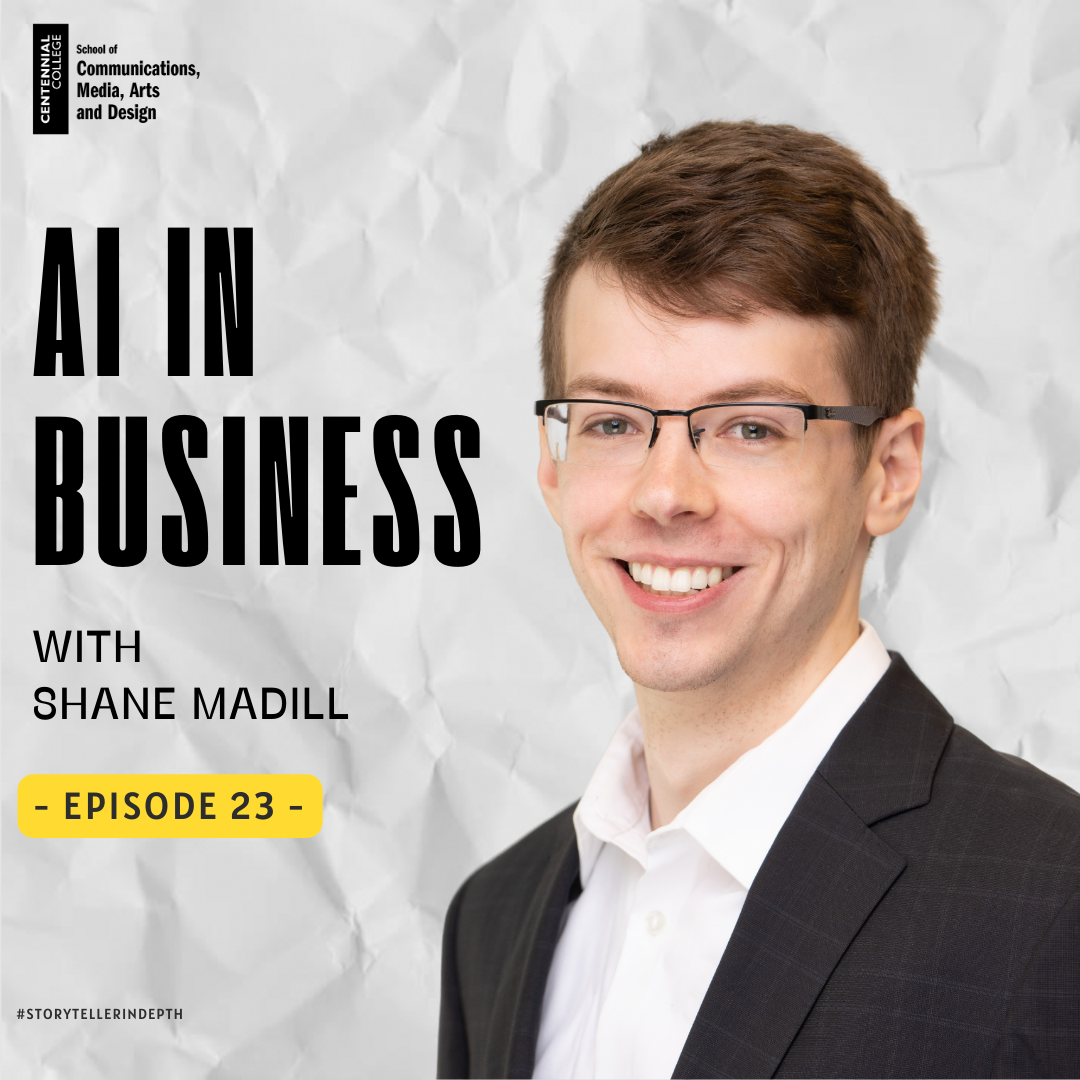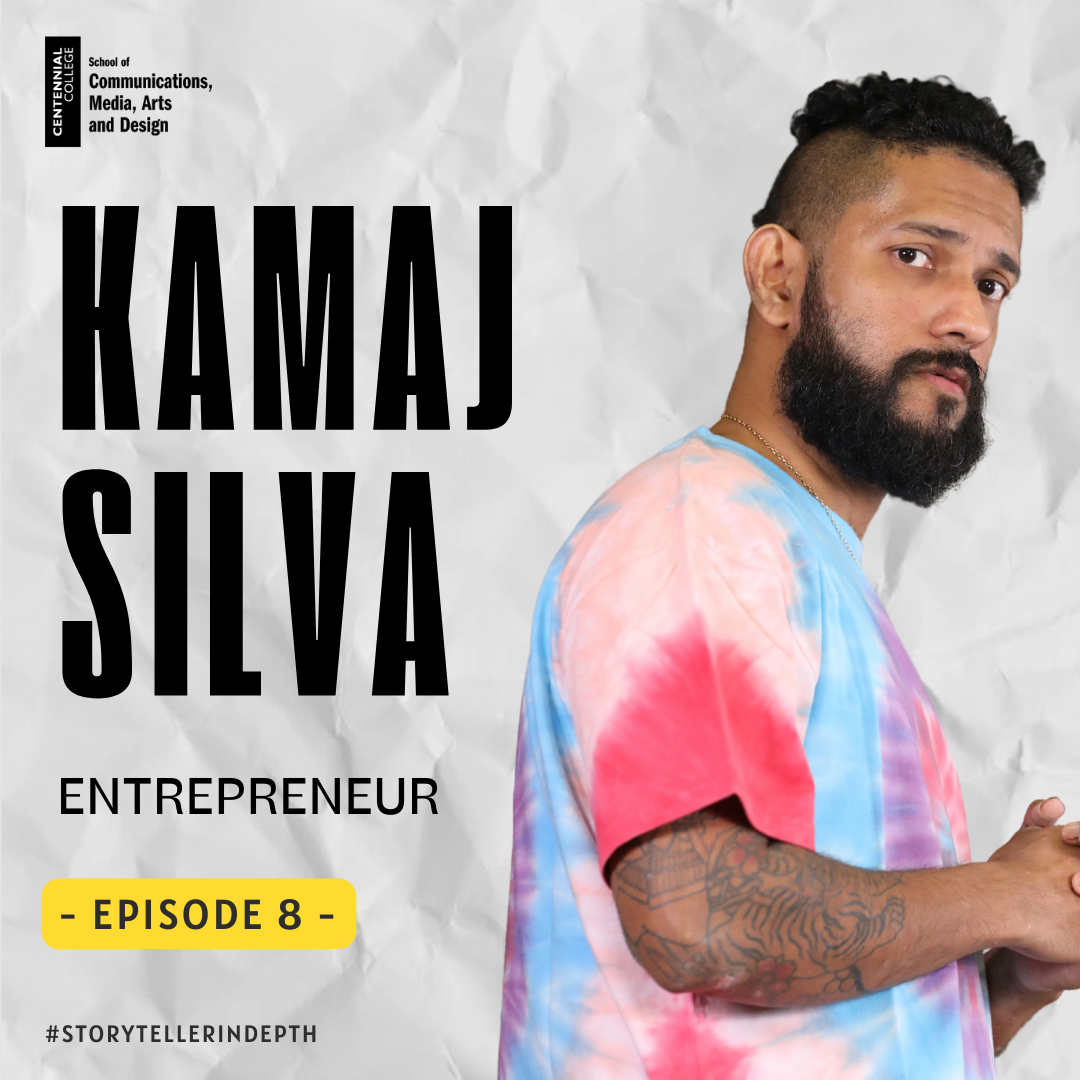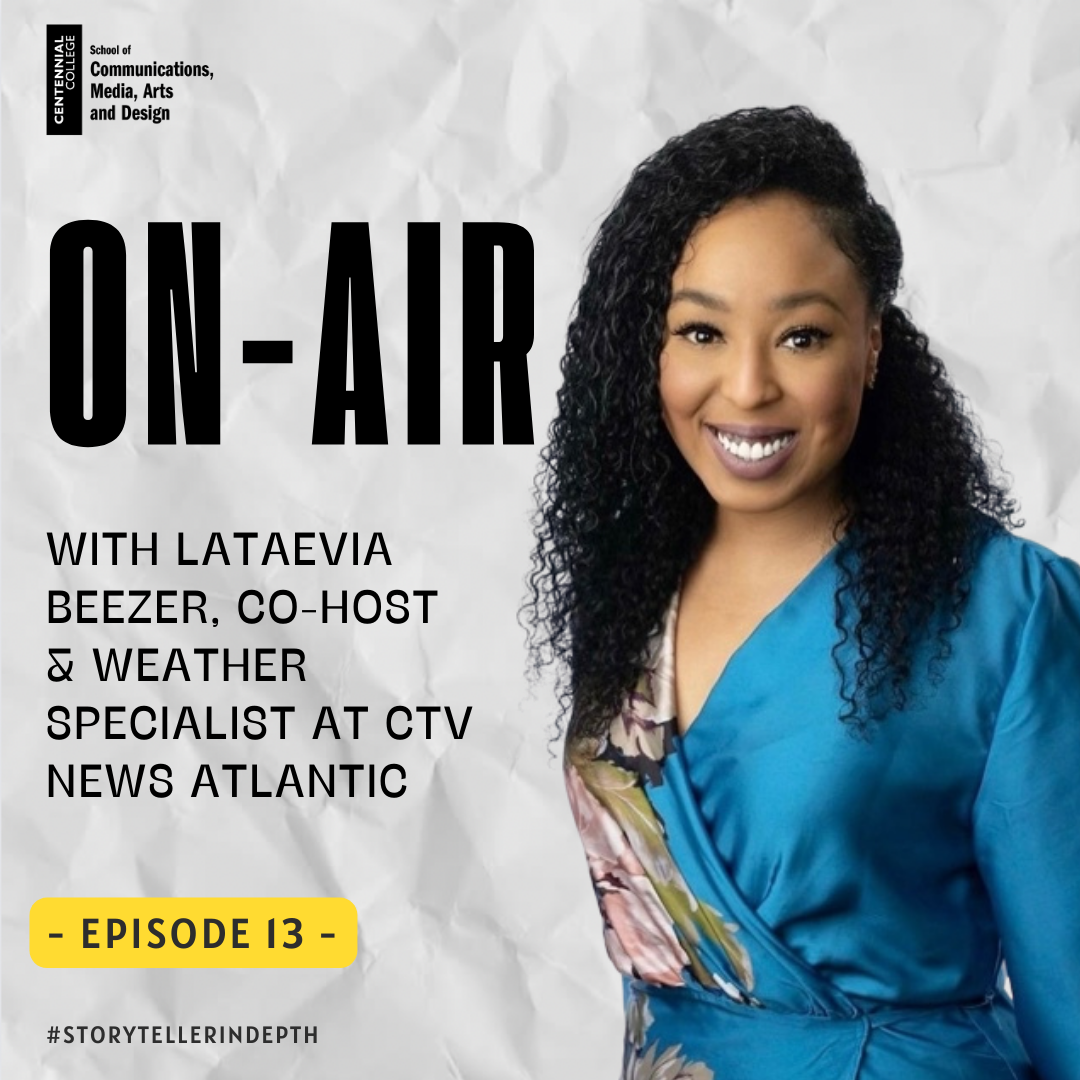Episode Transcript
[00:00:00] Speaker A: Hello and welcome to Storyteller in depth, a podcast where we go behind the scenes to learn more about the school of communications, media arts and designs, people, places, and things. I'm your host, Pat Quigley. Artificial intelligence seems to be growing by the day, and we've heard many stories about where it's currently being used and what's coming next. In our AI series of this podcast, we covered several different areas, from the writing industry to the gaming industry to content creation and more. In today's episode, though, we looks for a new path with AI, the world of business to help us navigate is Shane Medill, a 2019 graduate of our Public Relations Corporate Communications program. Shane works at the PR firm Kaiser and Partners, and he co wrote a white paper called AI Business strategy, corporate communications and balancing advancement, pocketbooks, and emotional change. Shane will take you through some of the elements of the white paper and explain how AI can be used effectively in this type of setting. So without further ado, let's get on to that conversation.
[00:01:12] Speaker B: Thank you so much, Shane, for being on the podcast today.
[00:01:15] Speaker C: Thank you for having me.
[00:01:16] Speaker B: Yeah. So before we begin, can you first share a little bit about yourself and the work that you do?
[00:01:21] Speaker C: Of course. I'm a senior account manager here at Kaizen Partners, I'll refer to as Campee. I'm a PR agency located in Toronto with offices in Vancouver and Quebec as well. Recently merged with Ernst Cliff as well. And so in the process of closing that deal as well. And so additional offices, additional services to come. But within KNP right now, I work with the financial services practice group with a focus on long form and specialty writing. And so things like annual reports, crisis training, simulation sessions, investor perception surveys, those kind of things where you need that kind of in depth knowledge and expertise and writing skill. I think I originally became interested in the work that I do now through education. And so, for example, I went to McMaster with a major in economics with minors in business and psychology. I gained a lot of work experience at the paper there, including a year as editor in chief, and so trying to figure out what I wanted to do afterwards, and landed on public relations at centennial as a combination of that academic and real life work experience that I had, just because I was pretty uncertain about what I wanted to do after the student journalism there, and so got engaged in PR, did well in the program, and went to KMP under the recommendation of Donna, the program coordinator, and worked my way up through the ranks ever since. So happy to be here and happy to be at KMP and everything that's awesome.
[00:02:42] Speaker B: And what was the genesis of that? What got you into this industry in the first place?
[00:02:46] Speaker C: Yeah, for sure. So when actually, I was going to say, especially starting in high school, I just had a love for writing and the english language and everything like that. Didn't really get to do too much of that in economics and education and everything like that. Obviously, you do quite a bit of writing there, but wanting to get more in depth with that and kind of practice those skills on a more frequent basis. And so that's where the student journalism aspect came in and kind of gaining the experiences there, being able to improve my writing over time, being able to do a service to the community as best I could through the means that I really enjoyed being able to report on the local news and give my opinion in that section and everything like that. So I think PR has been a good continuation of that over time, and being able to use my own skills and expertise to help communicate on behalf of people and clients and tell their stories and give their knowledge to the world.
[00:03:43] Speaker B: Wow. So recently you co wrote a white paper called AI Business strategy, corporate communications, imbalancing, advancement, pocketbooks, and emotional change. So before we kind of get into the more specifics of all of that, how did this begin?
[00:03:58] Speaker C: Yeah, for sure. So I would say that this opportunity came about after a good number of conversations with Thomas, who's the co author of the paper, and all of the expertise that he brings over from the financial services sector and helping tech integration there, and especially within the banking sector in particular, and just trying to figure out how we can contribute to the ongoing conversations. Obviously, AI has been such a common topic of conversation through media, through social media. Everyone has an opinion about it and what we can do with our own expertise in contributing to the landscape, and also to demonstrate the strategic thinking that we help with our current clients and prospective clients on. And so working with Thomas to kind of figure out what that looks like eventually landed on a white paper and refining that over the course of a few months to ensuring that our insights would be as evergreen as possible, especially within the technological and AI landscape, given how quickly it can develop over time and how easy it can be to get lost in the weeds a little bit when it comes to every little iteration of every little update that comes out over time. So that's kind of how it started and how it's progressed since then.
[00:05:03] Speaker B: Wow. And for our listeners and also for myself, who don't understand some of the jargon that you're using, what exactly is a white paper?
[00:05:12] Speaker C: Okay, so basically, when you think about a research paper, like for example, if you were doing a school project or something like that, and a teacher asked you to do like a five paragraph essay back in the day, you were learning how to write, learning your english skills and everything like that, you give the little essay to your teacher, she marks it, comes back, says, great work on this, this and this. Basically a white paper is a more advanced version of that, where it's just a more comprehensive collection of different thoughts about a particular subject. And so working with Thomas to basically put his thoughts to the page in a nuanced manner, but still trying to use as little jargon so people can understand it, who may not necessarily have a technical or an AI background.
[00:05:57] Speaker B: Okay, so have you always been interested in AI, or have you already been using it?
Is that kind of how the idea of writing the white paper came along?
[00:06:06] Speaker C: I would say I've been interested in AI for quite a while now, and especially more recently, given all the communications that have happened around it. So I think it's very interesting to see how people communicate different ideas like AI to their wider audiences and through the different channels that we have available to us, whether it know in a PR context, media relations, corporate communications, that kind of thing, or through social media. Obviously, people trying to advocate either way, get their own perspectives out, get their own ideas out. And so I think the communications of AI has been a particular emphasis, and especially within our day to day work, how that's started to change over time, keeping tabs on the news and being able to position our clients in those kind of regards, and just kind of the personal interest in AI in general, and especially how it's progressed since I started using a computer when I was four years old, and seeing how it's progressed so rapidly over the course of two decades.
[00:07:01] Speaker B: For sure. I know I've done a little bit of deep diving into AI myself, both through the podcast and the AI series we did. I think I said that, right? Yeah. Anyways, it doesn't matter, but just learning more and more about all the different types of AI and how much AI has been around for so long, it's just been glamorized almost since chat GBT and more, the generative AI has kind of come about. So it's interesting to hear about how it's diving into every little bit of our lives and how it's evolving so much over time.
[00:07:37] Speaker C: Yeah, definitely. And I think that's an important point that you bring up, too, about how it's changed so much over the last couple of years in terms of the modern applications of what we consider to be AI. And obviously generative AI is kind of the big key topic of conversation these days, but it has been around for so long, too. One of the examples that I use on a pretty frequent basis is translations. For example, we've seen AI generated translations for quite a while. People use Google translate all the time, for example, but we're still seeing quite a number of people, and even at our firm too, we just introduced the idea of a dedicated translation service and working on the steps when it comes to that, where people still want the professional, nuanced approach that only a human could give. And so even though that there are the free versions, slightly paid versions of AI translations, there is still a need for the strategic thinking and all the different nuances that come to translations. For example, I think that's one good example of how AI has kind of progressed over time, but it's not necessarily in the main conversation of generative AI. And obviously things like real time data supply chains are a good example of this, where you always need to make sure you have your warehouse logistics down, and everything's operational, running smoothly and everything like that. The financial sector, Thomas is particularly a good expert at this when it comes to trading on stock exchanges, for example, being able to do it electronically rather than manually, and having to go through different people, for example. So just different instances like that, where technological change just continues to happen over time.
[00:09:13] Speaker B: And kudos to you and Thomas for writing this white paper. I got a chance to read through it and kind of disseminate some of the information myself. And although I don't completely understand all of it at the beginning, it indicates that AI has some numerous benefits, and it also mentions that in the wrong hands, and if used or distributed irresponsibly, AI can lead to several negative outcomes. Why do you think it's important to start with this contrast in the introduction? And in your opinion, why is it important for businesses to know that there can be negative outcomes associated with its use before getting into some of its positive uses?
[00:09:50] Speaker C: Yeah, I think a lot of that has to do around the hype around generative AI in particular. Obviously, when a business is looking about how they can differentiate themselves from competitors, AI is one of the top things that they're thinking about these days. But it's also not an end all be all solution. It's not something you can just tack on to a business strategy and hope for success. It still requires quite a bit of implementation, quite a bit of investment, quite a bit of communications to make sure that everyone has buy in, and it actually makes sense for you and your business too. And so there's that way of looking at it in terms of seeing how it fits your business, even though it may not necessarily have to do with a certain problem, whether it is just cost efficiency or finding ways to integrate and kind of going through the process of how you can actually implement in that regard, but also just the ethical and legal considerations too. And obviously, this has come up quite a bit in conversations, in the sentiment that AI could replace people in the future. I know you've had quite a number of conversations in previous episodes with people in the gaming, writing, so on and so forth, when it comes to different aspects there, how it can change the tactical day to day of what people do, whether that's a benefit or detriment to the jobs there, and also just kind of on the legal side of things. I think Generative AI will continue to come up as political policies begin to catch up with the innovations that have been made over the last couple of years. I think one good example of this are the debates happening in Canada around the online Harms act. Even though that's more impacting the use of harmful deep fakes rather than businesses specifically, it's still something to monitor and a good example of how politicians are more and more aware of the influences of AI over time.
[00:11:31] Speaker B: Yeah, for sure. And there's other parts discussed in the white paper as well, talking about real world examples and a little bit of history. Why do you think it's important, when discussing AI, to have this whole picture and see where things are and how they are now?
[00:11:44] Speaker C: Of course. So I think when it comes to something that can be perceived as new and exciting and game changing as AI, I think it actually goes back to your point that you mentioned before about how it just continues to develop over time. It's just another milestone on the way. And so I think it's important to be able to ground your expectations and perception in that reality and understand that even though that there are these vast new concepts coming out and dreams of being able to create Hollywood movies at the press of a button than a prompt, this is just one in a progressing line of technological advancements. And so technology continues and progresses. Businesses learn how to integrate into their businesses faster, cheaper, better than previously, and these new technologies can cause these sectors to shift as well. Blockbuster is a good example of this in the physical versus digital distribution of content, and how Netflix uses AI and their algorithms to give you, ideally, what you want. Sometimes it doesn't work out the way you want it to, but just the idea of AI being used in those different aspects and giving rise to new competitors and new companies that are able to integrate it as best they can into the processes, I think that a lot of the conversations around AI tend to be more bottom up and look at the specific tactics and how it impacts someone's day to day and kind of how it impacts, like a job role, for example. But I think the top down approach that we've taken here and considering the full picture allows for these kind of nufs, perspectives and a grounding way of thinking where AI can represent kind of these widespread opportunities, like previous technical advancements, if it's implemented and communicated properly.
[00:13:29] Speaker B: Yeah, for sure. I guess from a consumer standpoint, right. You're only thinking exactly like you said from kind of the forward facing piece. Right. It's what Netflix is telling you you want, what Google Translate is translating for you, and you're kind of taking it at face value. But what are some of the other side of it?
What is the bottom up or no other way around? What is the top down version of this?
Why should we maybe be paying attention from the other side instead of so much from the glamorous side?
[00:14:05] Speaker C: Yeah, for sure. So I think one of the ways that we hear about the top down perspective is when a business reports their earnings, for example, we see at the end of the day, you know what they've lost a whole bunch of money investing in. Oh, I guess it was a failure. It was the wrong decision and everything like that. But one of the things that is kind of underappreciated in that is just kind of like the business strategy and the reason to go for AI in the first place. Microsoft is a good example of this, where they continue to incorporate AI and buy up all these AI firms and everything like that. Nvidia has become, I think, the third largest company in the world in terms of market cap because of the hype around AI and what they've been able to do over the last little while. But being able to look at the top down perspective and why that is in the first place. Understanding the business moves that they've made over the last little while also allows you to understand the end result when it does come about. And so if they're acquiring X company in order to do x, you'll eventually see Y in the future kind of thing. And so going back to the Netflix example, for instance, seeing what changes they may make in the future when it comes to AI, whether it is algorithm or their internal processes or their HR department, even, for example, internal communications. All those kind of different aspects can be viewed from both perspectives, too, whether it is the integration of the strategy itself or the end result that you see as a consumer.
[00:15:33] Speaker B: So if we look at this idea of AI in business as a whole, what do you personally think is one of the key lessons you want to communicate to businesses who are thinking about adopting it into their strategy?
[00:15:43] Speaker C: I think that one of the difficulties that a lot of businesses have is that they don't necessarily want to be the first ones to try and adopt AI. There's obviously a lot of challenges, and there's a lot of scary elements about something like this being the first one in a marketplace to try to do something, making the first step compared to your competitors, not really knowing if it's worked out in the past or seeing previous examples where companies have invested in AI and hasn't quite worked out. But I think that looking at the history of technological progressions over time, looking at the history of businesses and how they've been made obsolete in the marketplace because of competitors coming up who are able to better integrate technology into the workflows, I think it's a necessity to think about AI in at least some regard. It doesn't necessarily have to be a complete upending of your business and everything like that.
That's definitely not going to make the most amount of sense for a lot of different sectors and businesses, but being able to do the hard work and understand how it will impact the day to day operations of your employees, the business strategies that you put for the proposals, how people engage with your business, all really important considerations. And if you're able to differentiate yourself from your competitors in that regard, it's definitely something that you should move forward with as well. And especially since we have so many historical examples of companies who were successfully able to integrate AI or other technology into their business and come out the other side more successful than they were before, I think that people just tend to get caught up on the new concepts and ideas that companies and AI services are bringing forward these days without fully understanding, appreciating that this has happened in the past before, and it's happened quite a number of times, just in.
[00:17:30] Speaker B: Different contexts, for sure. And AI is not going away anytime soon, right? Everything's just going to continue kind of steamrolling down this hill?
[00:17:41] Speaker C: Yeah, I would say so. One of the things that is important to recognize is we don't necessarily know how it's going to progress from here. Obviously, we still have the historical trends and what people are currently pushing. Obviously, chat GBT is a good example of this, and kind of prompt based engineering is the term that they tend to use, and being able to create the actual outputs and everything like that. But one of the things about AI and technology in general is that it is very good at coming up with new solutions we can't currently quantify or think of. And so even going back to the Netflix example, for example, previously in the pre blockbuster period, it would have been so hard to conceive that idea in the first place and know that that's actually going to work in the market, too. And kind of the risk that it takes for our company to go forward and bring up a solution like that, seemingly out of the blue and before it seems to have all the right steps, integrated and everything like that. And especially as generative AI tends to be large language models, it's more like an aggregation of everything that's currently available in terms of writing ideas. But I think that still requires that human strategy, consideration, and thinking for you and your audiences to understand what AI means to you moving forward. And so I think that it is going to be very interesting to see whether people buy into things like chat GBT over time, or whether that's more of a business case, or whether we're going to go back to a more genuine human to human interaction. People are going to really desire that, as we've seen a little bit in the creative fields already.
[00:19:20] Speaker B: Oh, for sure. So how do you think more businesses will adopt into this technology, and how do you see certain roles potentially changing, at least in your experience thus far, in this industry?
[00:19:33] Speaker C: Yeah, I think a lot of businesses will kind of try to look at it as a cost saving measure. And so, again, going back to the creative example, we've seen this with the writer strike, for example, and trying to create outputs at as low a cost as possible, and just assuming that people will be okay with that. But we've seen the quality of AI generation, both in terms of writing and art and everything like that, not be quite up to snuff. People want people working on their creative fields at the end of the day. And I think there's the level of expertise, the level of nuance that AI just can't replicate at this point. And going back to the idea about translations, for example, I think you can mirror a similar idea here, where you have the free translations, you have AI generated translations, and you still have a whole host of professional translators who get paid a good amount in order to do the work that they do in different contexts, whether it is PR or media events. For example, I remember at the oscars not too long ago with parasite winning best picture and everything, that all of the hype that was for that particular translator and the nuances that they needed to communicate between Korean and English and not be a direct translation, which is what we usually see in AI regards. So I think that when it comes to the day to day, I think the creative fields will kind of experience that progression over time. Again, hard to say because we don't necessarily know how AR progress from here, but I think for businesses in general, because they're going to be looking at it still through that cost cutting lens and whether that is the actual outputs of a consumer facing employee, or whether that's on just their back end, for example, whether it is through things like operations and supply chain and everything like that. Honestly, the future might be a little bit more boring with AI than we come to expect based on how the conversations and ethics and legal considerations progress from here. But it is definitely something that we'll have to look at from both perspectives of the top down and bottom up.
[00:21:35] Speaker B: It's wild to think that it's still so new, that AI is still just in its budding infancy, even though it's been around for quite a while. And just every time I turn around I learn something new about AI and all the different industries and how it's impacting all the industries. So it's so cool to get your insights and through the white paper about AI. And we got really fortunate to talk to a lot of professionals in the past little while about AI, and we asked them a question, which I'm also going to ask you, is that if you could have access to any AI tool which can be imaginary or whatever, what would you love for it to do?
[00:22:14] Speaker C: I think a lot about the business case for a lot of AI, and especially through the white paper and through this conversation, obviously think about how different businesses can incorporate into their services. But I think one of the things that I would like to see is kind of more grassroots AI and being able to engage with surrounding communities a little bit more. I think about the idea of, for example, aggregating local events together in one spot rather than searching around all these different resources and sources and everything like that. Being able to compare grocery store prices to one another easily and know where to shop the upcoming weekend, learning about pop up stores quickly and being able to, I guess, make the city a little bit more walkable in a way, and being able to engage, whether it is close by, or I can save a little bit money by going a little bit further, for example, just getting out and about using AI. And again, dedicated people who are able to do that on a consistent basis for different locations around the city, for example.
[00:23:14] Speaker B: Those are really good ideas. I never even thought about the grocery one. That'd be so much easier if I could just pop in something to say, I want bananas. And it has all the prices from all the different places. That would just be perfect.
[00:23:25] Speaker C: Yeah. Just the idea of using AI to help people's day to day, not necessarily work related, and so helping the personal lives of people, I think would be like an idealistic, ideal goal for AI projects, and I think it would help out a lot of people, too.
[00:23:40] Speaker B: I think you're onto something, Shane. I definitely think you're onto something here. Somebody, if it comes back in the next couple years or next couple of months where we get an app like that, we're going to wrap up this.
[00:23:49] Speaker C: Conversation and come back to you for excited. I'm excited.
[00:23:55] Speaker B: Cool. Well, thank you so much, Shane, for the amazing discussion on AI today.
[00:24:00] Speaker C: Yeah, thank you for having me.
[00:24:09] Speaker A: What a wonderful insight that Shane could provide. Using AI to assist and help determine strategy while remaining aware of its downsides if it is used irresponsibly, is such an important aspect of this conversation.
Now, if you like this conversation, be sure to check out the other AI episodes we have posted and head over to our Instagram at Story art center and let us know your thoughts.
[00:24:30] Speaker B: Until next time, I'm your host, Pat.
[00:24:31] Speaker A: Quigley, and this is storyteller in depth.




